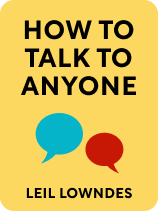

This article is an excerpt from the Shortform book guide to "How to Talk to Anyone" by Leil Lowndes. Shortform has the world's best summaries and analyses of books you should be reading.
Like this article? Sign up for a free trial here .
Is it a good idea to smile at strangers? Does smiling make people instinctively like you? What about eye contact?
They say that smiling makes people like you, but it’s not exactly so—it depends on how you smile. People are put off by quick smiles because they interpret them as impersonal. Another behavior that puts people off is a lack of eye contact because it’s interpreted as discomfort or distraction.
Keep reading to learn how your eye contact and smile influence others’ impressions of you.
Delay Your Smiles and Maintain Eye Contact
According to communications expert Lei Lowndes, people don’t respond warmly to quick, instinctive smiles because they assume that you’re flashing that smile at anyone you come across. This impels them to respond in kind, by acting detached or distant.
Another offputting behavior is lack of eye contact, which others interpret as a sign that you’re either distracted or uncomfortable, and this makes it difficult for them to form an emotional connection with you.
To get a warm response, Lowndes suggests that you avoid your instinct to flash a quick smile at anyone you meet. Instead, look the recipient in the eyes, pause briefly, and then let out a big warm smile while maintaining eye contact. The delay will convince recipients that you’re smiling just for them and they’ll instantly feel like you’re happy to meet them. As you continue your conversation, attempt to maintain a comfortable amount of eye contact to convince them that you’re interested in what they have to say.
More Facts About How We Interpret Facial Expressions
Research backs up what Lowndes has to say about how your eye contact and smile influence others. The following facts add further insight into what your facial expressions say about you.
Genuine smiles don’t only impel others to let their guard down, but can also make them feel happier in two ways:
– Smiling is contagious: It’s scientifically proven that your brain automatically notices and responds to other people’s smiles. It follows then that you’re more likely to receive a genuine, warm smile from someone if you smile first.
– Smiling releases endorphins: The physical act of smiling triggers the release of mood-enhancing neurotransmitters, such as dopamine and serotonin. Since smiling is contagious, your smile encourages others to smile—this changes their body chemistry and makes them feel happier.
Additionally, research shows that not only should you maintain eye contact, but that you should also avoid certain eye movements if you like someone:
– Narrowing your eyes: This indicates dislike—either of the people you’re talking to or what they’re saying.
– Looking down while around others: This indicates disinterest and can sometimes be interpreted as arrogance.
– Rapid blinking: This indicates anxiety.
– 100% eye contact: This indicates aggression and is often used before a fight.
Finally, your communication doesn’t stop with your eyes—you can also use your eyebrows to communicate. A quick raise of your eyebrows indicates a “yes” during a conversation. It can signal recognition, interest, approval, agreement, or gratitude.
– Give a quick eyebrow flash followed by a warm smile to convey that you like someone.
– Raise your eyebrows just before you say something to encourage someone to listen to you. Couple this with making eye contact 30% of the time to increase what they remember about what you say.

———End of Preview———
Like what you just read? Read the rest of the world's best book summary and analysis of Leil Lowndes's "How to Talk to Anyone" at Shortform .
Here's what you'll find in our full How to Talk to Anyone summary :
- Practical techniques to help you overcome social discomfort
- How to confidently develop new connections
- How to appear more likable without saying a word






